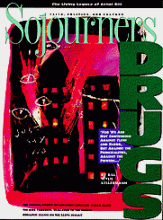Gerald G. May's new book, The Awakened Heart: Living Beyond Addiction (HarperSanFrancisco, 1991, $16.95, cloth) has the capacity to rekindle hope in wary hearts—real hope, rooted in honesty and faith, not in retreat from reality or creative conformity. But it takes a certain willingness to read these pages, for May's blended background of psychiatry and spiritual guidance enables him to challenge our deepest insecurities and disillusionment even as he nurtures our courage and dreams.
The Awakened Heart offers a spirituality that calls us to listen more to our hearts and less to our heads, to place more priority on love than on efficiency in our lives. May recognizes the "gentle warfare" between love and efficiency, saying, "The enemy is that which would stifle your love: your fear of being hurt, the addictions that restrict your passion, and the efficiency worship of the world that makes you doubt the value of love."
Addiction in May's lexicon is an expansive term. Building on his last work, Addiction and Grace (Harper, 1988, $9.95, paper), May writes, "Attachment nails the energy of our passion to someone or something, producing a state of addiction." He suggests that asking ourselves "freedom questions" is necessary for discerning how much we've allowed addiction to enter into our loves. "The difference is between attachment binding desire," he writes, "and commitment honoring desire." The "Freedom and Intention" chapter concludes with a very encouraging discussion of prayer—a turning toward the "source of love" in which complete freedom exists.
Read the Full Article
